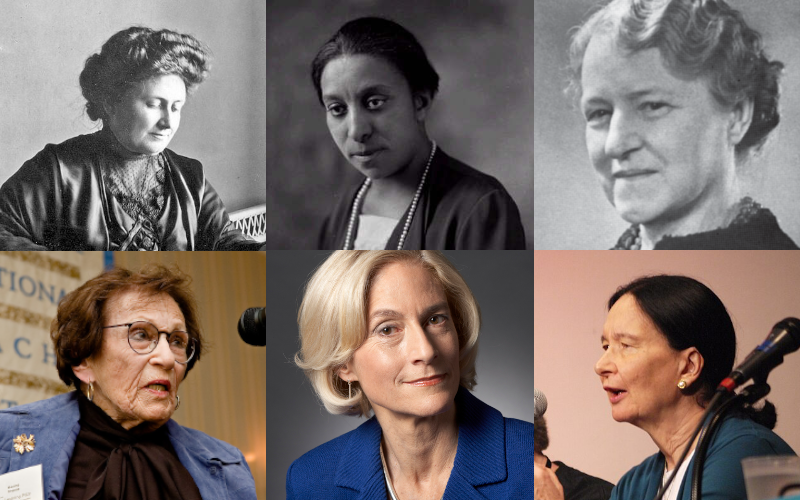Bringing women curriculum theorists into the light
By Blog Editor, IOE Digital, on 8 June 2023

Six women curriculum theorists, clockwise from top left: Maria Montessori, Lucy Diggs Slowe, Susan Isaacs, Susan Haack, Martha Nussbaum, Maxine Greene (Credit: public domain; Alpha Kappa Alpha; IOE Institute Archives; zooterkin; Robin Holland; Ryan Brenizer, all Wikimedia Commons)
Sandra Leaton Gray and David Scott.
At David’s retirement party, after all the toasts and speeches, we started discussing something that represents a still accumulating problem in the field of curriculum studies: how is it that so many of the seminal works relating to curriculum theory focus exclusively on the contributions of men, given that there are many such female theorists (and professional educators are more likely to be women)? To that end, recently we have been giving a great deal of thought to different formations and interpretations of feminism, as a way of gaining new insights into the field.
This has been challenging, as feminism is something that can be regarded as both a concept and a practice. As a concept, feminism is complex, powerful, and dynamic, with aspects that rub up against various forms of contemporary identity in difficult, and sometimes uncomfortable ways, particularly when we are talking about intersectionality. As a practice, like Schrödinger’s cat, feminism is present and not present in educational life at the same time – we use language that signals equality, but the presence of women in leadership and management is still lacking in some quarters. In this way, feminism is certainly an ongoing project of democratic voice and engagement.
Although women have been actively involved throughout the centuries in making societies, they have been marginalised when it comes to the production of knowledge about societies and social activities. This has implications for how we conceptualise masculinity and femininity, and how these key categories function to define the nature of people’s contributions, as well as defining who people really are (which may not necessarily be neatly classified as male or female). In other words, it is a question of who is allowed to determine the construction and boundaries of knowledge, and what the related consequences of that might be. The book we have just published, Women Curriculum Theorists: Power, Knowledge and Subjectivity (Routledge, 2023) attempts to interrogate that very question.
We discuss women’s involvement in curriculum theory, knowledge development and learning, and what form these might take. Debates surrounding the curriculum are central to processes of modern schooling and related policy formations, which makes this an important area of enquiry. There doesn’t seem to be a convincing reason for male dominance in the field other than intellectual habit and convention, especially considering the obvious range and depth of women’s wider contributions. From the earliest days of religious communities providing education to girls, to contemporary contributions to global social justice, women have been evident throughout. To deny women curriculum theorists their place in history is to silence the voices of half the population of the world.
In our book we draw on 12 women curriculum theorists in particular: Maxine Greene, Susan Haack, Julia Kristeva, Martha Nussbaum, Nel Noddings, Jane Roland Martin, Marie Battiste, Dorothea Beale, Susan Isaacs, Maria Montessori, Mary Warnock and Lucy Diggs Slowe. It was genuinely hard to select a representative body of women for analysis, and we make no claims to have done so. Instead, we provide scholarly vignettes that highlight aspects of interest and relevance. However, the central thread running through the book can be seen as an analysis of the relationships between feminism, in its many shapes and guises, and the different concepts and practices of learning and curriculum. This is a more complicated set of issues than is generally acknowledged, and we do not come to any definitive and binding conclusions, as an empiricist or positivist is inclined to do. What we do, however, is open up and illuminate possible meanings in the hope of provoking debate.
Image
Six women curriculum theorists, clockwise from top left:
- Maria Montessori (Wikimedia Commons)
- Lucy Diggs Slowe (Alpha Kappa Alpha on Wikimedia Commons)
- Susan Isaacs (IOE Institute Archives)
- Susan Haack (zooterkin on Flickr/Wikimedia Commons, CC BY-SA 2.0)
- Martha Nussbaum (Robin Holland on Wikimedia Commons)
- Maxine Greene (Ryan Brenizer on Flickr/Wikimedia Commons, CC BY 2.0)
 Close
Close



